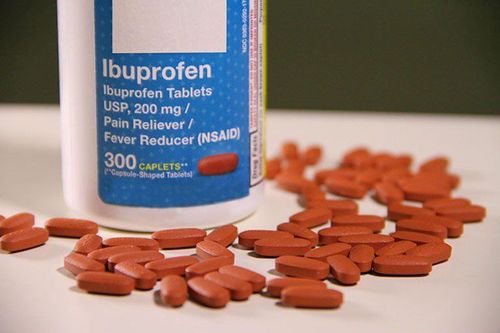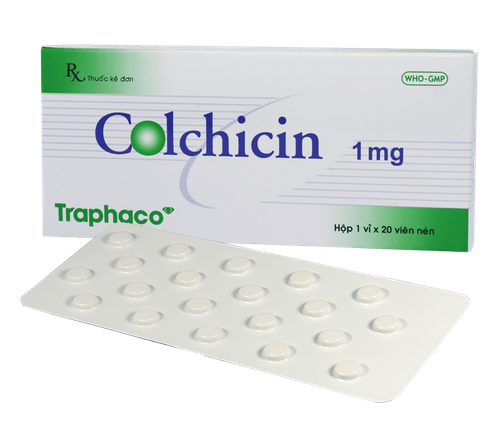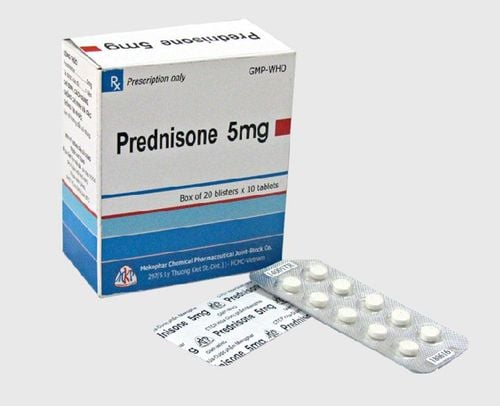This is an automatically translated article.
Article written by Pharmacist Huynh Xuan Loc - Faculty of Pharmacy - Vinmec Central Park International General Hospital
Non-steroidal anti-inflammatory drugs (NSAIDs) are a group of commonly used pain relievers and anti-inflammatory drugs that provide good treatment results but cause many side effects if used arbitrarily. So what disease is this drug used in, what should be noted when using it? This article will help you better understand this drug.
What is the NSAID group? NSAID (Non-steroidal anti-inflamatory drug) is a group of non-steroidal anti-inflammatory drugs, including many different active ingredients. This is also one of the most used drug groups, especially in osteoarthritis pain. NSAIDs can be over-the-counter medications such as Ibuprofen used to reduce fever and general pain, but they can also be medications prescribed by a doctor. NSAIDs are effective in treatment but can also bring serious side effects such as ulcers, gastrointestinal bleeding, allergies or cardiovascular complications if used arbitrarily.
Mechanism of action of NSAID drugs NSAIDs inhibit the enzyme cyclo-oxygenase (COX) thereby preventing the formation of inflammatory prostaglandins in the body. The process of inhibiting this COX enzyme, on the one hand, has analgesic, antipyretic and anti-inflammatory effects, but also affects a number of other biochemical processes in the body such as forming blood clots or reducing the synthesis of mucosal protective substances. stomach side effects.

Thuốc chống viêm không steroid (NSAID) là nhóm thuốc giảm đau, kháng viêm
What diseases do NSAIDs treat? NSAID drugs help reduce fever, anti-inflammatory and pain relief from common illnesses such as flu, headache, toothache, menstrual pain ... to specialized diseases such as trauma, arthritis, rheumatism. NSAIDs also appear in many different forms from tablets or syrups, oral nuggets, creams, ointments for external application to rectal tablets or eye drops, so patients should also be careful to avoid duplicate use. or drug overdose.
Side effects of NSAIDs? Most people who take NSAIDs do not experience any adverse reactions. However, there is still the possibility of side effects, common include:
Effects on the digestive system: The drug can cause symptoms of digestive disorders such as bloating, indigestion, heartburn, nausea. .. When using NSAIDs for a long time and especially at high doses, patients can develop ulcers and more serious stomach bleeding. People with pre-existing inflammatory bowel disease or adults over 65 years of age are at high risk for this side effect. Effects on the cardiovascular system: NSAIDs may increase blood pressure and be detrimental to pharmacological control of blood pressure. NSAIDs also increase the risk of a heart attack in people who have cardiovascular disease (coronary artery disease) or are at high risk for cardiovascular disease. In this group of patients, NSAIDs are used only when clearly needed and often at the lowest effective dose for the shortest possible time. Effects on liver and kidney function: Short-term use of NSAIDs can also damage the kidneys, especially in people who already have underlying kidney disease. The hepatotoxicity of NSAIDs also needs to be taken into account when used in high doses or for long periods of time. Therefore, in some cases, liver and kidney function tests are necessary in patients taking NSAIDs. NSAIDs can also irritate asthma and cause allergic reactions. Tinnitus is also a common side effect of high doses of aspirin, but is rare with other NSAIDs. This side effect usually goes away after reducing the dose or stopping the drug.

Sử dụng NSAID lâu ngày có thể gây kích ứng làm tăng nặng bệnh hen suyễn
Choice of NSAID Although the same group, the NSAIDs are different in terms of therapeutic efficacy and side effects as well as safety in different patient populations. Moreover, the effects of a drug are not the same when used in different individuals, so that an NSAID may be suitable for one person but harmful when used for another. Therefore, choosing the right NSAID is essential to ensure safety and effectiveness for patients.
For over-the-counter NSAIDs used to treat common ailments such as headaches, toothaches, aches and pains..., patients should carefully read the instructions for use of the drug to rule out caution and anti-inflammatory effects. prescribe and use the drug according to the recommended dose of each product.
With prescription NSAIDs, the doctor will base on your medical history, medical condition and test results to choose the right drug. Sometimes people have to try one drug and then switch to another to find the best NSAID. Patients can participate in the choice of NSAID by periodically visiting and informing the doctor about the progress of the disease and side effects encountered. This information is essential in the treatment process.
Note when using NSAIDs Inform the doctor if the patient has cardiovascular diseases (angina, coronary artery disease, history of stroke, heart attack ...), gastrointestinal inflammation (ulcers) peptic ulcer disease, gastroesophageal reflux disease ...), asthma, urticaria or history of allergy to pain relievers, other NSAIDs.
Habits or risk factors that cause patients to experience side effects when taking NSAIDs such as high blood pressure, smoking, drinking a lot of alcohol, poor health ... should also be informed to the doctor when examining sick.
Monitor for harmful side effects or other health abnormalities when taking the drug, especially in patients with pre-existing cardiovascular, digestive, kidney disease or asthma. Patients should stop taking the drug and go to medical facilities immediately if dangerous symptoms appear such as: weakness, shortness of breath or difficulty breathing, severe chest pain, weakness in part or one side of the body, lethargy, and slurred speech. , swelling of the face or throat, skin rash, stomach pain, black stools or vomiting blood...

Người bệnh cần thông báo cho bác sĩ nếu thấy các tác dụng phụ hoặc bất thường sức khỏe khi dùng thuốc
NSAIDs interact with various drugs such as anticoagulants (warfarin, heparin ...), antiplatelet agents (clopidogrel), antiepileptics (phenytoin), immunosuppressants (cyclosporin) ... Therefore, the patient should inform the doctor about the drugs currently taking to avoid adverse interactions. Concomitant use of different NSAIDs should also be avoided because of the increased risk of adverse events.
Patients need to take medicine as prescribed by the doctor and follow-up appointments. Do not abuse the drug or prolong its use without consulting your doctor.
For common NSAIDs that do not require a prescription, they should only be used for a short time according to the dose recommended in the instruction sheet. Patients should seek medical attention if symptoms persist after taking the drug.
To ensure safety, when you have health problems and intend to use this drug, you should go to a medical facility to see a specialist doctor for examination and treatment advice and prescriptions. Vinmec International General Hospital is a high-quality medical facility in Vietnam with a team of highly qualified medical professionals, well-trained, domestic and foreign, and experienced.
A system of modern and advanced medical equipment, possessing many of the best machines in the world, helping to detect many difficult and dangerous diseases in a short time, supporting the diagnosis and treatment of doctors the most effective. The hospital space is designed according to 5-star hotel standards, giving patients comfort, friendliness and peace of mind.
Please dial HOTLINE for more information or register for an appointment HERE. Download MyVinmec app to make appointments faster and to manage your bookings easily.













